15 days and 14 nights
Vladivostok - Ulan-Ude - Irkutsk - Novosibirsk - Yekaterinburg - Moscow
This great journey from East to West will leave you with unforgettable memories. The journey lasts for 2 weeks and passes through 6 fascinating cities. Starting on the Pacific coastal city of Vladivostok with its harbor of the Golden Horn and Amursky bay then passing through the Buddhist city of Ulan-Ude with the Ivolginskiy Datsan (Buddhist Temple), continuing on to Irkutsk - the heart of Siberia and home to Lake Baikal and then to Novosibirsk - a very dynamic city with the world famous scientific town Akademgorodok. You will visit Yekaterinburg, the first Siberian city, associated with the tragic Fate of the last Tsar and finally end your journey in golden domed Moscow.
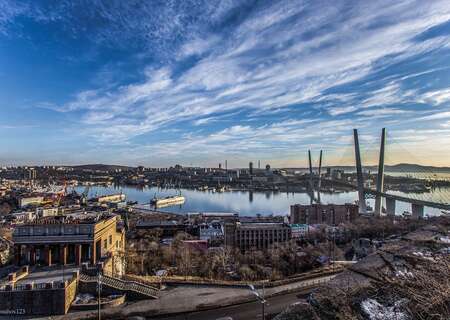
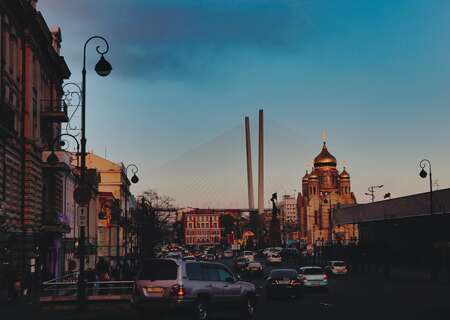
On arrival in Vladivostok, you will be met at the airport by our representative and will be taken by car or mini bus to your hotel. The expedition to discover the "Lord of the East" now begins.
Vladivostok Russia’s largest port city on the Pacific Ocean is situated at the head of the Golden Horn Bay and near the border of China and North Korea. The city is home to the Russian Pacific Fleet. The territory on which modern Vladivostok is located has been part of many nations, including the Mongol Empire and China and in the past was populated by Chinese, Manchu and Koreans. Russia acquired the region in 1858 at the end of China’s Opium War with Britain. The naval outpost was founded in 1859 by Count Nikolay Muravyov Amursky who named it Vladivostok, translated as “Lord of the East.” An elaborate system of fortifications was erected between the 1870s and 1890s and a telegraph line from Vladivostok to Shanghai and Nagasaki was opened in 1871. The city´s economy was given a boost in 1903, with the completion of the Trans-Siberian Railway. The city was fiercely fought over during the Russian Civil War but finally taken by the Red Army in October 1922. This battle marked the end of the Russian Civil War and consolidation of power by the Soviets. Since that time, Vladivostok has been Russia’s main cultural, trade and militarily important city on the Pacific Coast.
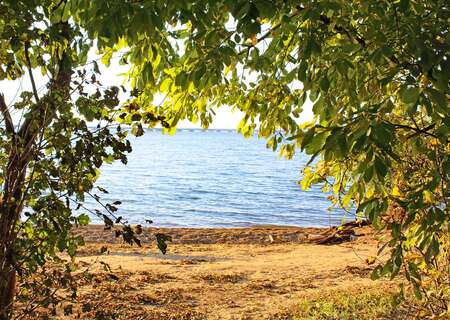
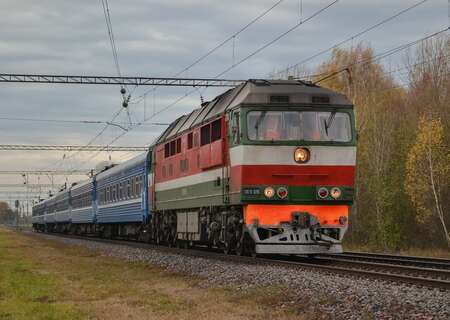
After the breakfast, get ready for the city tour. During this panoramic tour of Vladivostok, you will see all the main attractions and highlights of the city: the Vladivostok Railway Station – terminus of the Trans-Siberian railroad, the S-56 submarine on the harbor embankment and the area on which the city was founded 142 years ago. You will also visit the highly regarded Arseniev Museum to view exhibits of the region’s rich treasures of flora and fauna as well as the culture and history of the Vladivostok area.
After the tour, you will be taken to the train station.
Train leaves Vladivostok in the evening.
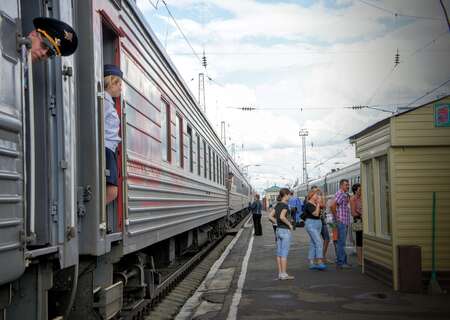
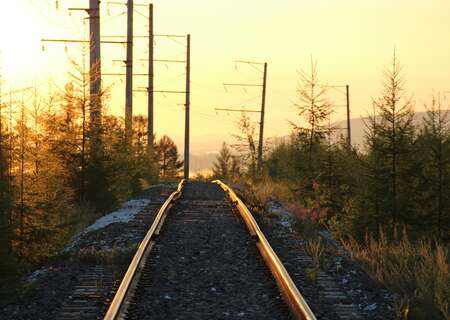
The train journey from Vladivostok to Ulan-Ude is two and a half days. But the comfortable compartment will make you feel at home. The landscape along the way is typically Siberian, with endless taiga and rivers and lakes. The intenseness of the nature will surprise you and you will definitely feel that you have left civilization far behind. During the 20-25 minute stops, you can walk near your wagon and replenish your provisions.
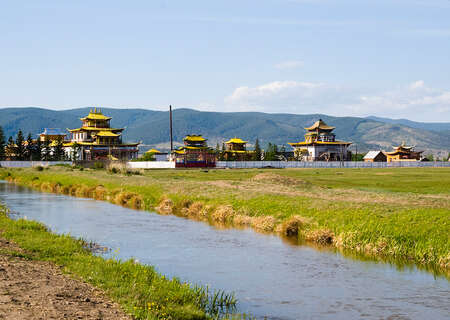
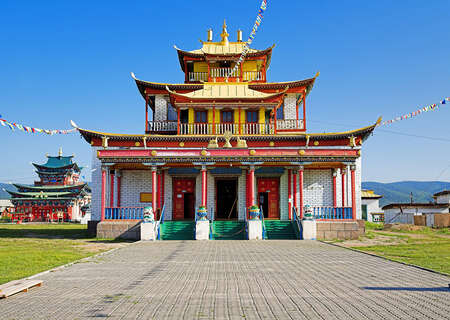
Your train arrives in Ulan-Ude where our representatives will meet you. Before checking into your hotel, you will see the city for the first time. Buryatia is a small, mainly Buddhist republic. Here you will finally feel that you are in Asia! After rest we will have a short walking tour of the city, visiting the History Museum of Buryatia. To conclue the day, you will taste traditional Buryat cuisine at the Yurta Kochevnika. You will then return to your hotel.
Ulan-Ude is the capital city of the Buryat Republic of Russia and is located about 100 km (66 miles) south-east of Lake Baikal on the Uda River at its confluence with the Selenga. The first occupants of the area where Ulan-Ude now stands were the Evenks and later the Buryat Mongols. The city was initially founded in 1666 by Russian Cossacks as a fortress. Due to its favorable geographical position, the city grew rapidly and became a large trade center which connected Russia with China and Mongolia. The Trans-Siberian Railway reached the city in 1900, causing an explosion in growth. The population which was 3,500 in 1880 reached 126,000 by 1939. On 27 July 1934, the city was renamed Ulan-Ude. Today the city has a population of about 360,000. You will definitely get a taste of the East when in Ulan Ude. The major religion of the area is Tibetan Buddhism and you will see Buddhist monuments and temples during your time here.
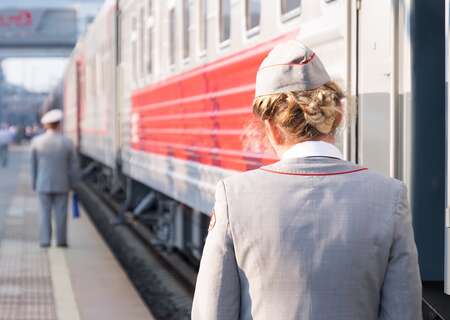
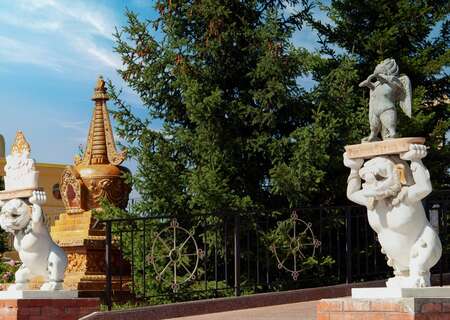
This is a free day. You can explore the city yourself.
In the evening your train leaves to Irkutsk.
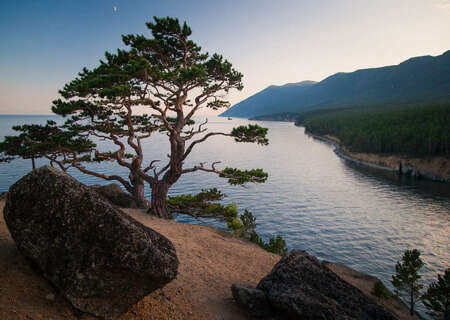
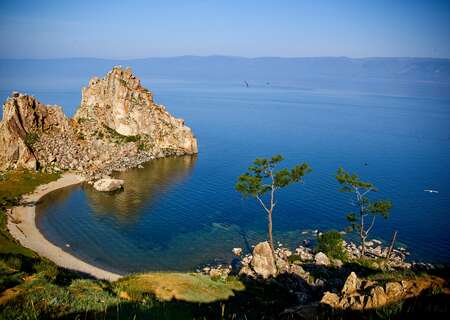
In the morning, your train arrives in Irkutsk where our representatives will meet and take you to Lake Baikal, the largest body of fresh water on earth. On the way from Irkutsk, we will make a stop at the Ethnographical museum “Taltsy” consisting of examples of Siberian wooden houses from the past centuries.
We will also make a stop to see the lake from the “Cherskiy Peak” observation point. On arrival to a hotel we will have lunch (optional). This is not the end of the day; we will also visit the Limnological museum, where exhibits of the unique fauna and flora that surround the lake are displayed. There is also an aquarium where you can see different species of local fish and the Baikal nerpa – the earth’s only fresh water seal. And we will visit the functioning St. Nicolas the Miracle-Worker Orthodox Church.
Lake Baikal is the largest freshwater lake in the world with an average depth of 744.4 m (2,442 ft) and contains roughly 20 percent of the world´s surface fresh water. The body of water is also known as the “Baikal Sea” and the "Pearl of Siberia". At 1,642 meters (5,390 ft) Lake Baikal is the deepest, and among the clearest lakes in the world. At more than 25 million years old, Baikal is also the world´s oldest lake. Baikal is home to more than 1,700 species of plants and animals, two thirds of which can be found nowhere else in the world and was declared a UNESCO World Heritage Site in 1996. It is also home to the Buryat people who follow the Tibetan Buddhist religion and reside on the eastern side of the lake rearing goat, camel, cattle and sheep.
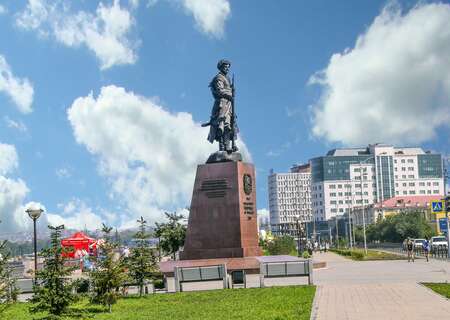
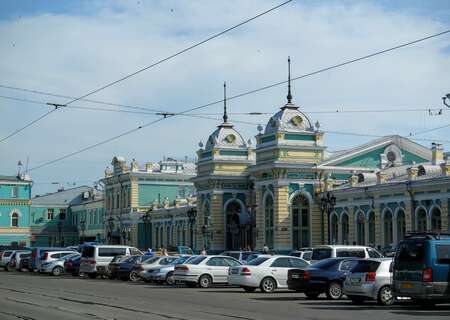
After breakfast you will travel by comfortable car or mini bus to Irkutsk where you will drop off your luggage in the luggage room of a hotel and continue on with your tour.
After this you will be taken on a city tour. The tour includes a visit to the Cathedral of the Holy Sign (Znamensky Cathedral). Apart from ornate and rich iconostasis, the cathedral is famous for its graveyard where you will see the graves of the Decembrists Mukhanov, Beschasnov, Trubetskoy and the Russian Columbus Shelekhov. We will then proceed to the Museum of the Decembrists. The museum is housed in a mansion belonging to one of the leaders of Decembrist Revolt. The Decembrists were Russian aristocracy who were banished to Siberia after their ill-fated attempt in December 1825 to overthrow the Russian Tsar in favor of a Constitutional regime. The museum evokes the period of 18th century Russia.
Before being taken to the train station to continue your journey you will visit the hotel to pick up your luggage. Your train leaves at the evening.
Irkutsk began as a small settlement in the mid 17th century for gold-trading and for the collection of the fur tax from the Buryats (the local inhabitants of the area). The settlement officially became a town in 1686 and the first road between Moscow and the new city was built in 1760. With the road construction, many new products, often imported from China, were widely available in Irkutsk for the first time including gold, diamonds, furs, wood, silk and tea. In 1821, Irkutsk became the seat of the Governor-General of East Siberia. In the early 19th century, many Russian officers and nobles were sent into exile in Irkutsk for their part in the Decembrist revolt against Tsar Nicholas I. Due to this influx of individuals from St. Petersburg, Irkutsk became the Siberian center of intellectual and cultural life. By 1900, the city had earned the nickname “The Paris of Siberia.” Today Irkutsk has become a college town with many young people studying at the university and other institutes of higher education in the city.
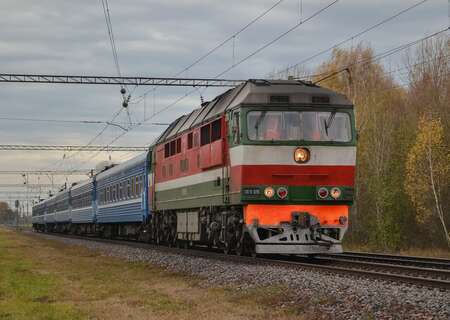
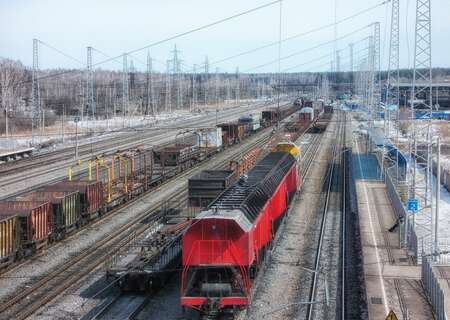
This part of Trans-Siberian route is considered to be the most beautiful. The trip will take you almost the entire day. The train will cross over many rivers. Your train arrives at night at the largest train station along the Trans-Siberian Railroad, our representative will meet you with a car or minibus and help you get to your hotel. On the way to the hotel, you will have the opportunity to get your first look at this mighty Russian city.
Novosibirsk is the third largest city in Russia after Moscow and St. Petersburg and the largest Siberian city. The city was founded in 1893 at the future site of a Trans-Siberian Railway bridge crossing the great Ob river. The city was first named Novonikolayevsk in honor of both Saint Nicholas and Tsar Nicholas II. During Stalin’s industrialization of Russia, the city experienced rapid growth and became one of the major seats of industry in the Soviet Union. In the 1950s, the scientific research complex of Akademgorodok was constructed about 30 km south of the city center. The Siberian Branch of the Academy of Sciences is headquartered in Akademgorodok and the town hosts a total of fourteen research institutions and universities making it one of the most important centers for science research in the world. In 1962, Novosibirsk reached a population of one million. At that time, it was the youngest city in the world with over a million people. Novosibirsk took fewer than seventy years to achieve this milestone.
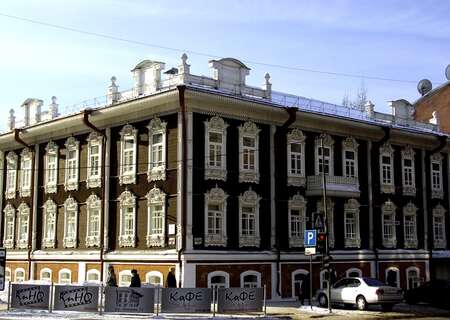
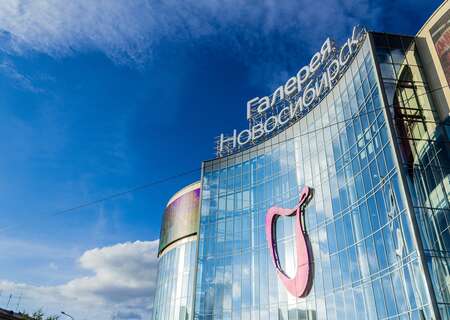
Be ready for an exciting tour to the scientific town of Akademgorodok and around Novosibirsk. Right after breakfast, you will leave for your tour. Akademgorodok is a city built entirely for scientists and their families and is well known throughout the International scientific community. The tour will take you to the Geology Museum at the Geology Research Institute, the Open-Air Train Museum exhibiting a collection of old Trans-Siberian trains. (30km outside of Novosibirsk). You will then continue into Novosibirsk again and be taken on a panoramic city tour. Our guide will show you Krasny Prospect, Alexander Cathedral, Lenin Square which features the vast Opera House. You will also visit the oldest part of the city, Gorkogo Street with its old wooden houses, the tiny St. Nicolas Chapel marking the very center of Russia and the Ob river embankment.
After your excursion, you will have free time before going to the station. Our representatives can help you find a good local restaurant (optional) where you can sample genuine Siberian cuisine. Then, on to the train station to continue your journey
Train to Yekaterinburg leaves in the evening.
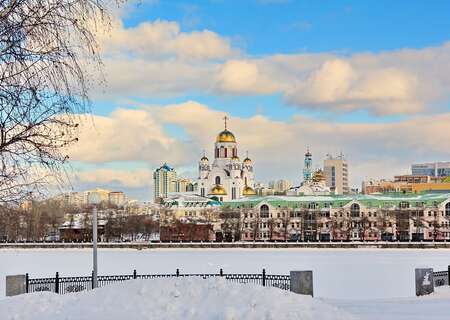
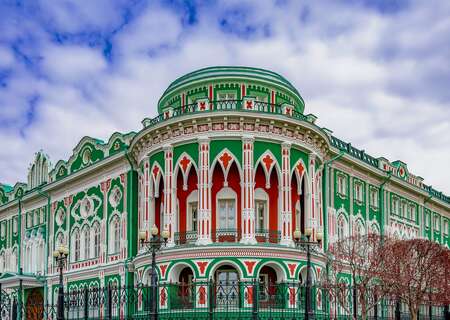
On arrival at noon in Yekaterinburg our friendly representatives will meet you at the train station and bring you by car or mini bus to your hotel.
Yekaterinburg was founded in 1723 and named after Saint Catherine, the namesake of Tsar Peter the Great’s wife Empress Catherine I (Yekaterina). Soon after the Russian Revolution, on 17 July, 1918, Tsar Nicolas II, his wife, Alexandra, and their children Grand Duchesses Olga, Tatiana, Maria, Anastasia and Tsarevich Alexei were executed by the Bolsheviks at the Ipatiev House where they were being held prisoner. Yekaterinburg is also famous for being located directly on the border between the Europe and Asia. It is also the hometown of Russia’s first president Boris Yeltsin.
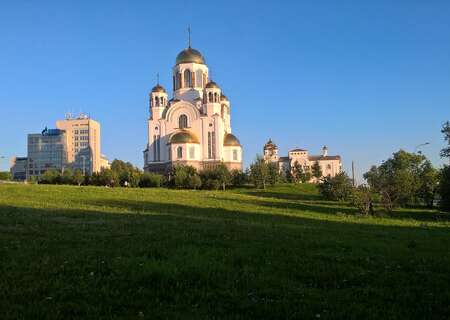
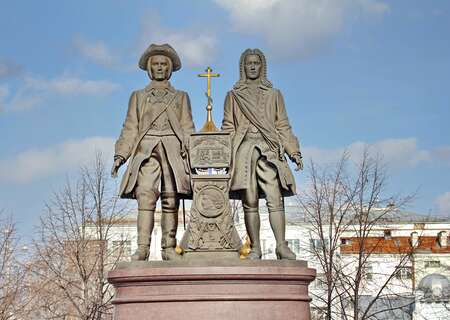
After breakfast, you will start your first excursion which explores the last days of the Romanovs and is combined with a city tour.
The excursion will acquaint you with the history of the Romanov family in Yekaterinburg and detail their tragic death. You will visit the Monastery dedicated to the family of the last Tsar. The Monastery is located on the spot where the Bolsheviks tried to hide the Romanov’s corpses in a secret grave. Today, this area is a well-known Russian Orthodox pilgrimage site.
After viewing the Monastery and the neighboring wooden churches, you will go on to see the main historical sites of Yekaterinburg: The Historical skver (park), the wooden dam of the city’s first plant, the old city embankment and a monument of Lenin, leader of Soviet Russia. The tour will also take you to places connected to the first President of Russia – Boris Yeltsin who originates from Yekaterinburg. After the excursion, you will be taken back to the hotel and have free time to walk around the city.
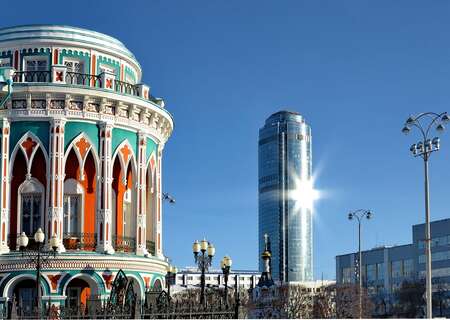

After a breakfast, you will be taken to the railway station. Train departs in the morning.
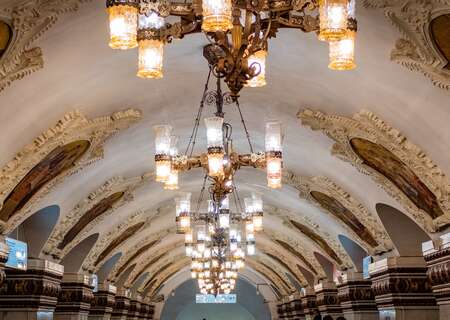
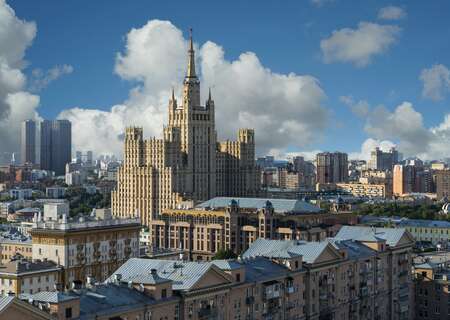
On arrival in Moscow, you will be met by our friendly representative who will escort you by car or mini bus to your hotel. On the way to the hotel, you will have the opportunity to get your first glimpse of this truly unique city.
On Panoramic City Tour, our professional guide will escort you on a route that includes Vorobyevi Hills where you will get an incredible view of the city from an observation point. You will proceed to Moscow State University which is an example of architecture from the time of Stalin and one of Russia’s leading schools of higher education, then on to Novodevichy Convent, Victory Park, the Triumphal Arch and Kutuzovsky Prospect. You will get a chance to see from the outside, the Russian seat of power - the Kremlin and Red Square and continue on to see much more of this storied city.
Moscow is the capital and the largest city in Russia as well as the largest metropolitan area in Europe with a population well over 10 million. This amazing city has served as the capital of the Soviet Union, the Russian Empire and the Grand Duchy of Moscow. Moscow has had a tumultuous history dating back to medieval times when it was founded by Prince Yuri Dolgoruki (Yuri of the Long Arms, known for the length of his arms!) in the early 12th century. It has seen numerous invasions and sieges from the Mongols to the Poles and Lithuanians to the Crimean Tatars to Napoleon and finally the Nazi’s but it has persevered and today is a thriving metropolis. The city is filled with unique architecture from the Kremlin and Red Square to giant Stalin skyscrapers to new office blocks built during the economic boom of recent years and it contains a strikingly beautiful metro system. The city is the center of political as well as economic power in Russia and visitors can feel the energy in the streets. There is always something going on in Moscow and there is so much to see.
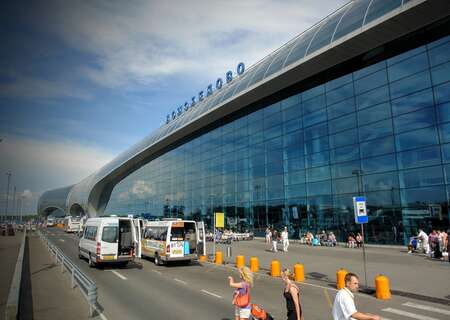
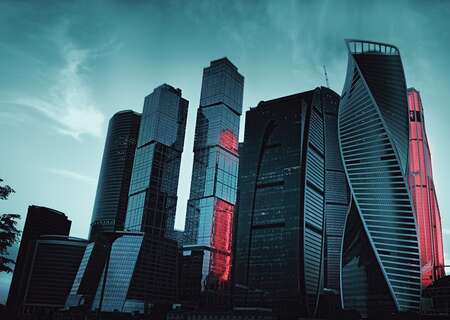
After breakfast at the hotel you will have some free time. In afternoon, you will check out of the hotel and will be transferred to airport.
These sights are included into the standard package:
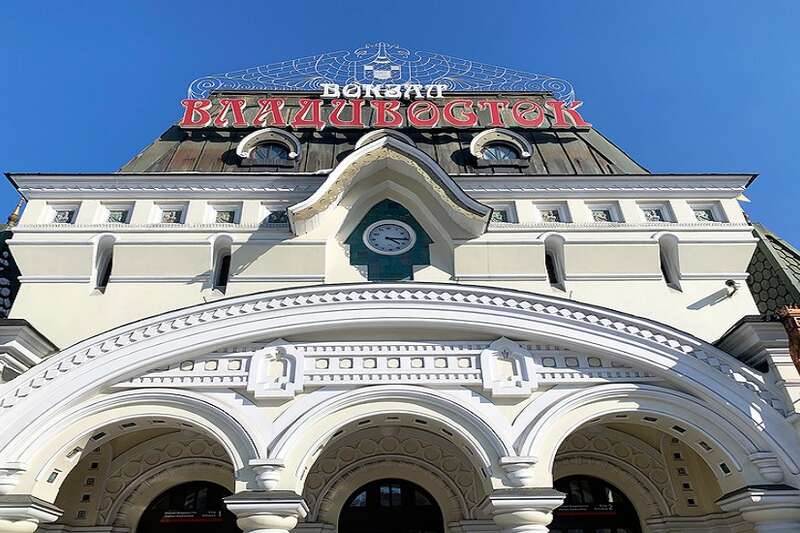
The foundation stone of the station was laid by the architect Bazilevsky in 1891 in the presence of Crown Prince Nicholas, future Emperor Nicholas II. In 1893, the station was officially opened and trains on Vladivostok - Ussuriysk route were launched. In 1910-12 Yaroslavsky Railway Station in Moscow was built, and it was decided to rebuild Vladivostok station in similar style so as to created architecturally completed stations on both ends of Trans-Siberian Railway. There were several more changes in the ensemble in the course of the 20th century, and finally in 1994-1996 the station was restored to the original pre-Revolutionary look.
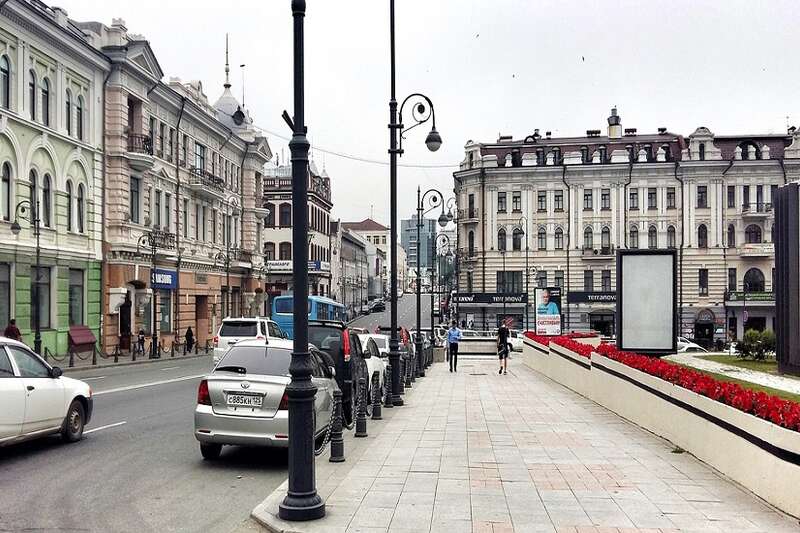
Arseniev Museum was founded in 1884 and opened to the public in 1890. It belonged to the Society of Study of the Amur region. Major part of the collection was formed in the XIX century and it consists of ethnographic and archaeological exhibits. Today the museum is a large-scale exhibition space where traditional and new museum technologies co-exist. The museum building is located in the heart of the city and is a monument of town-planning architecture of the early XX century.
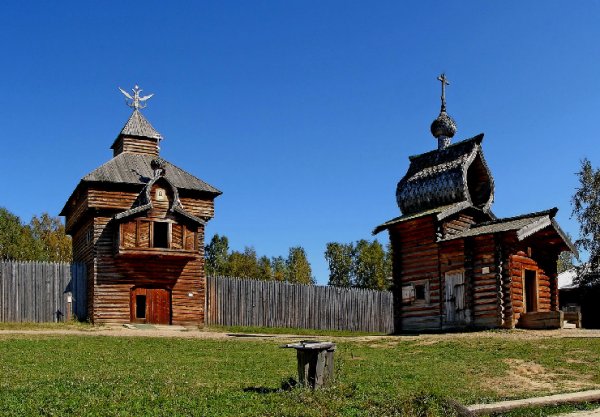
This architectural and ethnographic museum opened its doors to the public in 1980. On the territory of 67 hectares there are over 40 architectural monuments (fortress wall, churches, barns, water mills, parish school, peasant houses) and over 8,000 exhibits that tell about life in the Siberian villages XVII-XIX centuries. The museum often hosts folk festivals, and is also often used by filmmakers because of its authentic look.
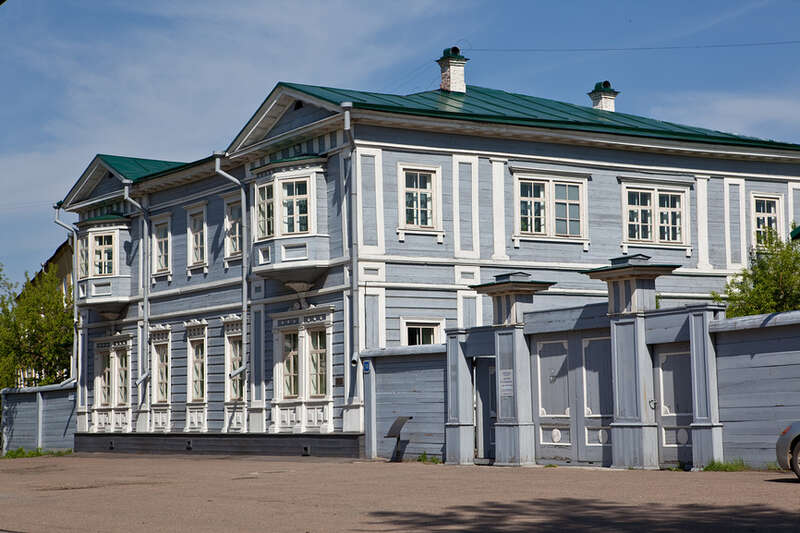
The museum is housed in a mansion belonging to one of the leaders of Decembrist revolutionaries - these were Russian aristocracy who were banished to Siberia after their ill-fated attempt in December 1825 to overthrow the Russian Tsar in favor of a Constitutional regime. The museum is truly evocative of 19th century Russia.
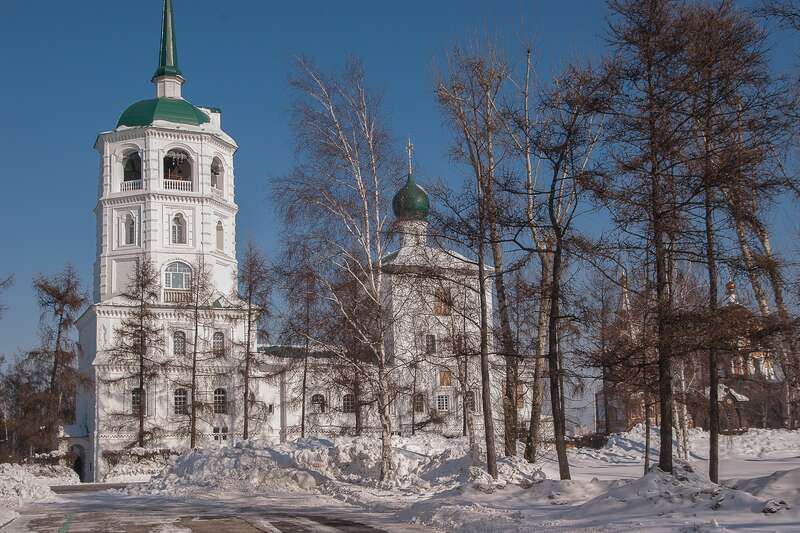
Apart from ornate and rich iconostasis, the cathedral is famous for its graveyard containing the graves of the Decembrists Mukhanov, Beschasnov, Trubetskaya and the Russian Columbus Shelekhov.
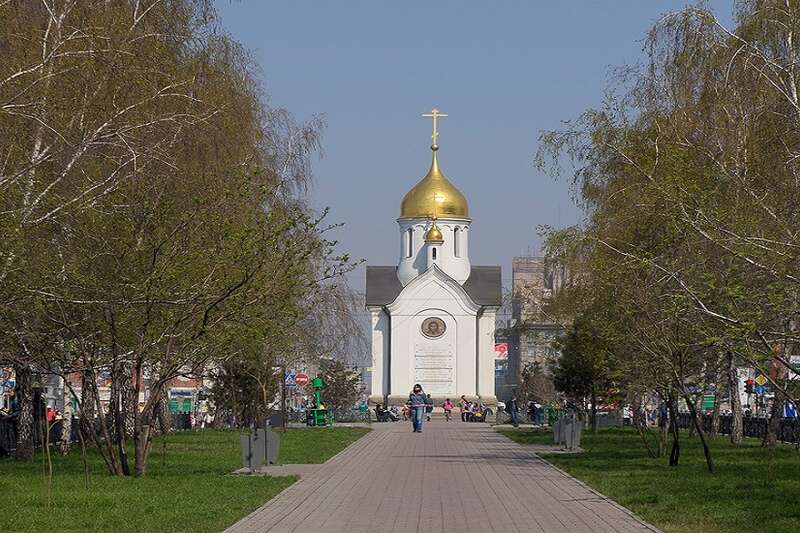
Chapel of St. Nicholas the Wonderworker is is one of the symbols of Novosibirsk and is considered to be the geographic center of the Russian Empire (as of 1913). Today geographic centre of the country is located in Krasnoyarsk region.
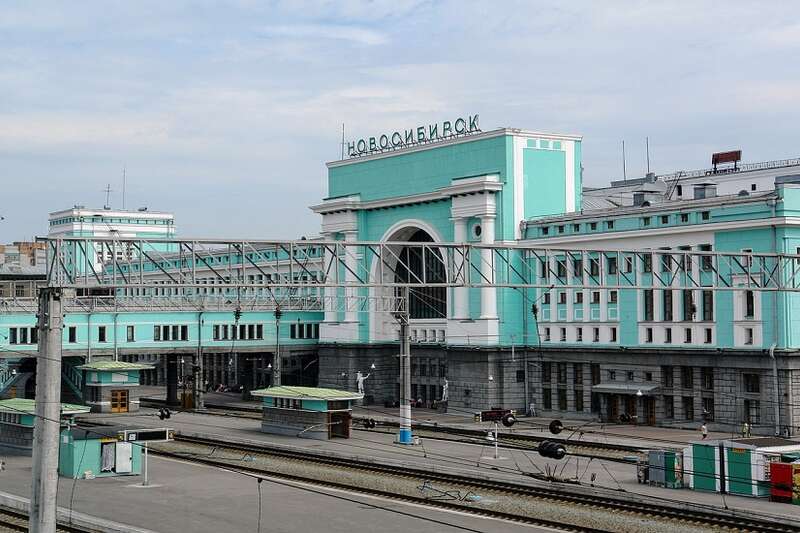
Founded in 2000, this museum numbers 60 exhibits displayed on 6 railway tracks. The museum has a large collection of steam locomotives, diesel locomotives, electric locomotives and railcars that used to work on West Siberian Railway. In addition, one can see here Soviet cars GAZ, Moskvich, and ZAZ as well as several trucks, tractors and all-terrain vehicles.
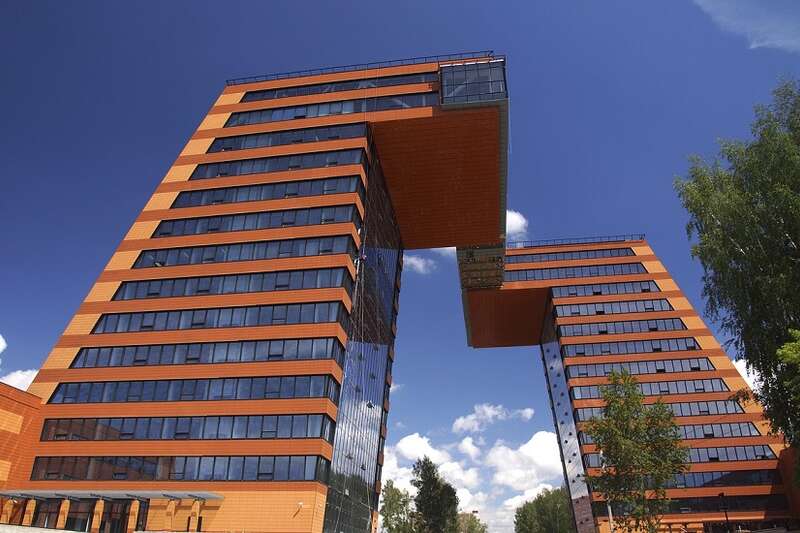
Akademgorodok is a city built entirely for scientists and their families and is well known throughout the International scientific community. The town has an interesting Geology Museum at the Geology Research Institute.
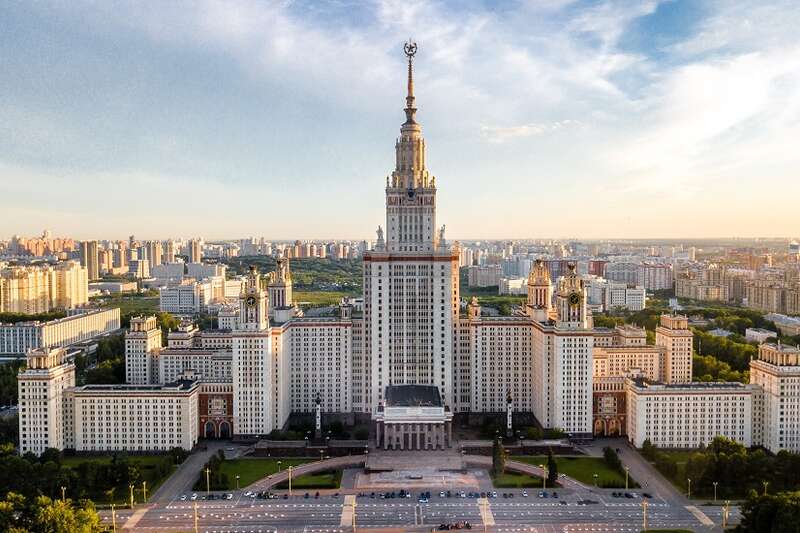
Major Moscow highlights include: Vorobyevi Hills with an incredible view of the city from an observation point; Moscow State University which is an example of architecture from the time of Stalin; Novodevichiy Convent, the Diplomatic Village, Victory Park, the Triumphal Arch, Kutuzovsky Prospect, the Arbat and much more.
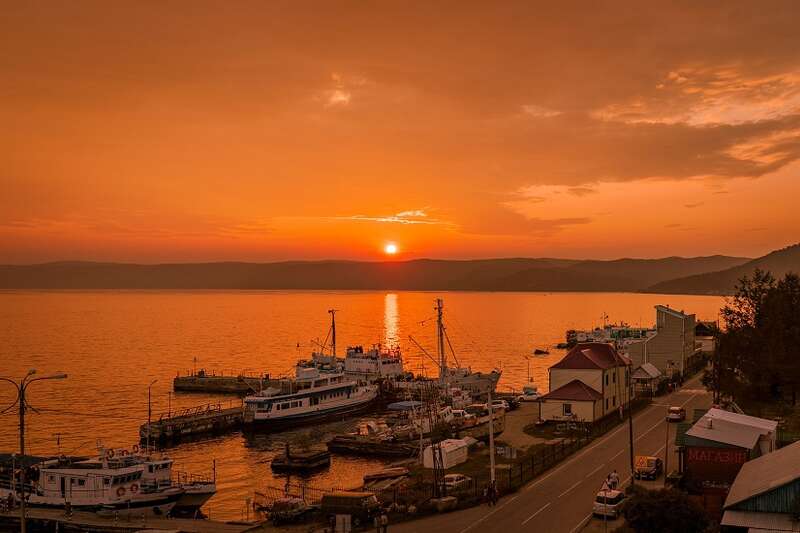
Listvyanka is a small settlement located on the shore of Lake Baikal. On the way from Irkutsk to Listvyanka there are 3 places of interest. The first is the obo - a sacred place for the local Buryat people. The second is Taltsy - an open air Museum of Russian Wooden Architecture. The third is the famous Shaman Rock (another sacred site) located on the headwaters of the Angara river. Listvyanka is also home to the Church of Saint Nicolas the Wonderworker - the guardian angel of travelers, and the Baikal Ecology Museum with exhibits of the unique fauna and flora that surround the lake. There is also an aquarium which contains different species of local fish and the Baikal nerpa - the earth's only fresh water seal.
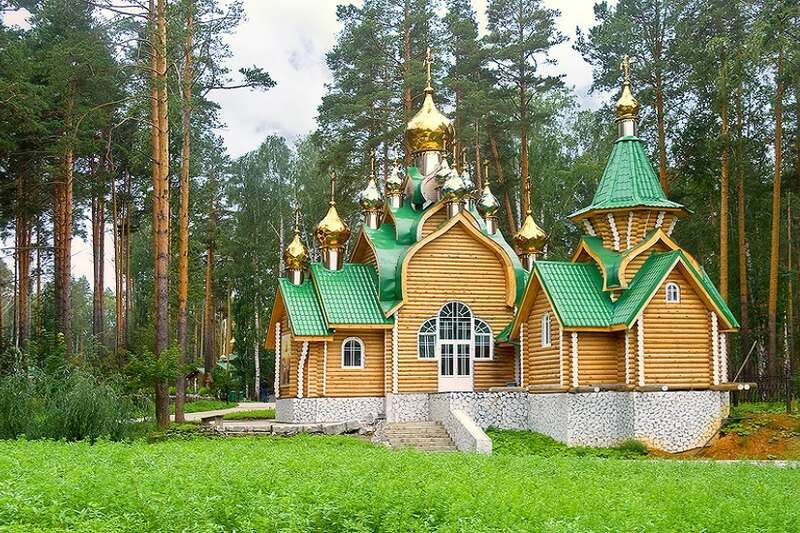
Ganina Yama Monastery was built on the site of an abandoned mine, where in 1918 the remains of the Imperial Family were burned. Even back in the Soviet Era, there were people who came to this quiet secluded place to pay their respect to the Romanovs. Only in 1991 memorial cross was put here, and in 2000 construction of the Church of Holy Royal Martyrs was started. Today the monastery numbers seven churches, all of which are located in a picturesque pine forest.
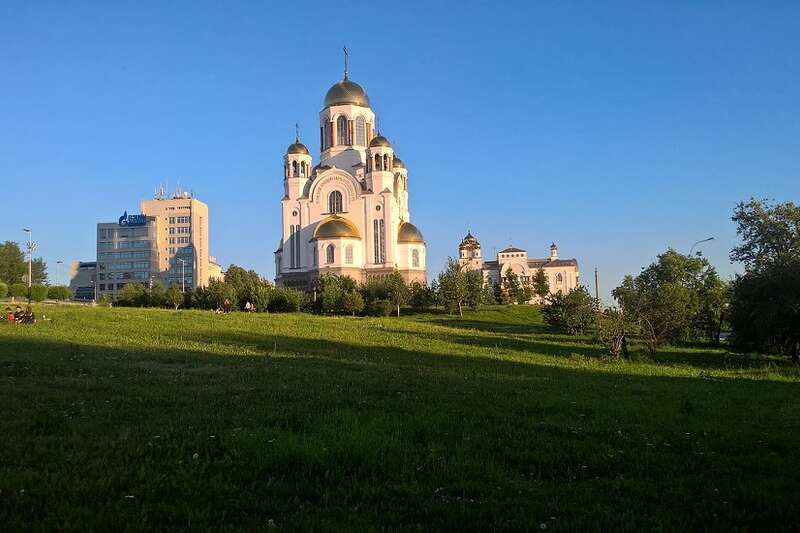
Church on the Blood was erected in 2000-2003 to commemorate the place where the last Imperial Family of Russia – the Romanovs – was executed. Next to the church is a memorial to the Romanov family. It includes the composition of the seven sculptures illustrating the moment when the family descended to the basement of Ipatiev House, and the execution room where an altar is set on the site of the murder. There is also an exhibition here devoted to the last days of the Romanovs
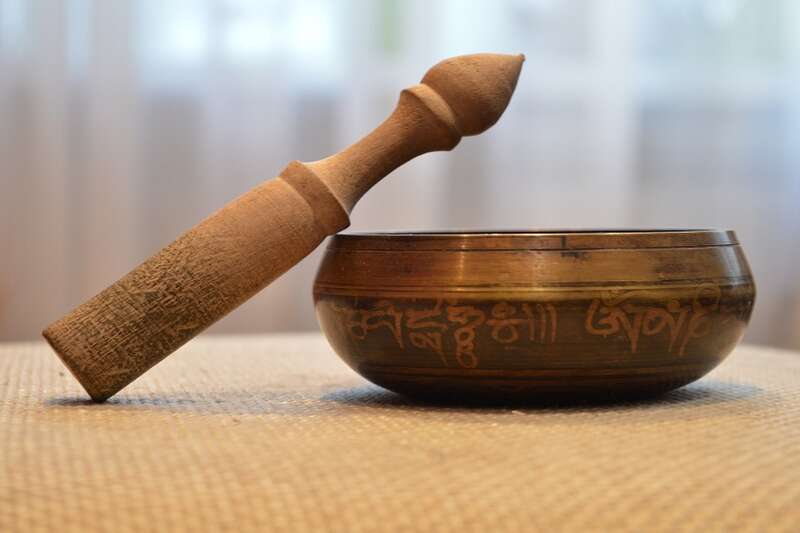
Founded in 1919, today the museum numbers 100 000 items. The museum has archeological, numismatic and ethnographical collections, as well as a collection of rare books, documents, photos and also a collection of religious art that deserves special attention. Buddhism as the major religion of the region is very well represented here.
| 1st class | 2nd class | |
|---|---|---|
| 1 | $7584 | $6567 |
| 2 | $5086 | $4069 |
| 3 - 4 | $4769 | $3752 |
| 5 - 6 | $4430 | $3413 |
| single supplement | $644 | $644 |
| 1st class | 2nd class | |
|---|---|---|
| 1 | $8105 | $6857 |
| 2 | $5607 | $4359 |
| 3 - 4 | $5290 | $4042 |
| 5 - 6 | $4951 | $3703 |
| single supplement | $644 | $644 |
Prices are per person based on double occupancy in a specific hotel. If you travel in a group but decide to stay in a single room, please add the single supplement to the price. We offer discounts for groups of 7 or more. To inquire about group rates, please contact us.
Please note:
Train fares and schedules are subject to change without notice and the program may be slightly changed in this event. However, this will not influence the quality of the services and we will do our best to make your trip unforgettable!
Regular trains are used for these tours. On these trains, there is no WC your individual cabins and no shower on board. A different train is used for each leg of your journey. There is no guide accompanying you during your time on the train. A new guide will meet you by the train on arrival in each city and they will accompany you back to the train station on the last day in that particular city.
Every effort will be made to adhere to tour pricing, however, currency fluctuation is beyond our control and may affect final costs.
Prices include:
Single compartment in the train is available on request
Not included:
Payment policy:
To book a tour, a 30% deposit is required at the time of booking. The trip must be fully paid 61 days before departure.
Cancellation policy:
Join us on Facebook
We invite you to become a fan of our company on Facebook and read Russian news and travel stories. To become a fan, click here.
Join our own Russian Travel, Culture and Literature Club on Facebook. The club was created to be a place for everyone with an interest in Russia to get to know each other and share experiences, stories, pictures and advice. To join our club, please follow this link.